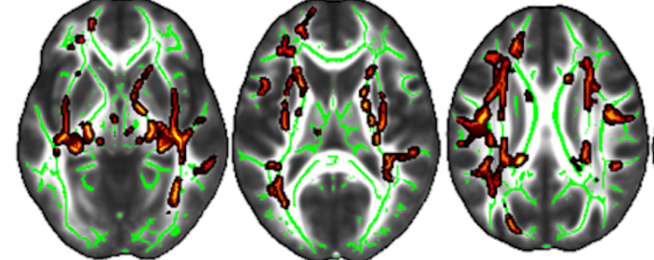Your brain has better structure and functioning if you exercise and are fit, a major new study has found.
Researchers used a massive MRI brain scan database of more than 1200 brains of volunteers who underwent additional cognition and fitness tests.
The team from Munster in Germany found that the fit subjects had superior white matter structure in the brain, and they also tested better for cognition skills.
Healthy white matter is known to improve the speed and quality of nerve connections in the brain.
Team leader, Dr Jonathan Repple said: "It surprised us to see that even in a young population cognitive performance decreases as fitness levels drops. We knew how this might be important in an elderly population which does not necessarily have good health, but to see this happening in 30 year olds is surprising.
"This leads us to believe that a basic level of fitness seems to be a preventable risk factor for brain health."
Scientists have previously shown that "exercise is good for the brain," but most studies have not controlled for underlying causes which might give distorted results, such as body weight, blood glucose levels, education status, age and other factors, making it difficult to take an overall view of the benefits. In addition, studies have rarely looked at fitness in relations to both brain structure and mental functioning.
"The great strength of this work is the size of the database. Normally when you are dealing with MRI work, a sample of 30 is pretty good, but the existence of this large MRI database allowed us to eliminate possibly misleading factors, and strengthened the analysis considerably."
The researchers said that this type of study raises an important question.
"We see that fitter people have better brain health, so we now need to ask whether actually making people fitter will improve their brain health.
"Finding this out is our next step. There are some trials which point in that direction, but if we can prove this using such a large database, this would be very significant.”
Professor Peter Falkai, who was not part of the study, commented: "This is an important cross-sectional study demonstrating a robust correlation between physical health and cognitive functioning in a large cohort of healthy young adults.
"This correlation was backed by changes in the white matter status of the brain supporting the notion that better macro-connectivity is related to better brain functioning.
"It stresses the importance of physical activity at all stages of life and as preliminary recent evidence suggests one can start improving physical health even in later life even if one has never trained before.
"These findings however need to be replicated in longitudinal studies and translated for the use in mental illness."
Become our friend
Find out more about Bicycle Network and support us in making it easier for people to ride bikes.


